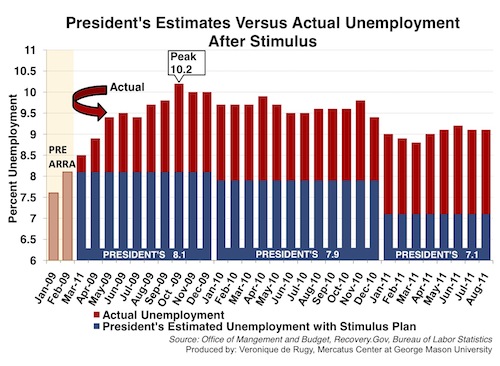Harry Reid: ‘Private Sector Jobs are Doing Just Fine; It’s the Public Sector...
UPDATE: Jim Geraghty crunches some numbers in this post on the topic.
Via Adam Bitely, that direct quote can be seen in the video below:
For context, here's Sen. Reid's (D-NV) statement from the Senate floor today:
"The massive layoffs we've had in America today-of course they're rooted in the last administration-and it's very clear that private sector jobs are doing just fine. It's the public sector jobs where we've lost huge numbers, and that's what this legislation's all about. And it's unfortunate my friend the Republican Leader is complaining about that. I would also note that my friend said the House passed another bill. Well, they pass lots of bills, but they rarely go anyplace."
Here's a fact that Reid should look over before he opens his mouth again. According to the U.S. Bureau of Labor Statistics, government workers have the lowest unemployment rate of any industry or class recorded, at 4.7%, while the national unemployment rate is 9.1% – nearly twice that of public sector workers.
Further, I seem to recall – contrary to Reid's assertion that the private sector is "doing just fine" but that public sector employment funding has been overlooked – an almost $1 Trillion ($1,000,000,000,000.00) "stimulus" bill being passed and signed into law early in the Obama administration whose major purpose was to fund "shovel-ready" public-sector jobs and to "save essential government services." Now, Harry Reid is telling us that the public sector needs another fiscal shot in the arm, while Vice President Joe Biden (D-DE) is telling audiences that a failure to pass another stimulus bill to follow the first, utterly failed one will lead to mass rape and murder of…somebody.
Via Michelle Malkin, here's a graph from the Mercatus Center's Veronique de Rugy showing just what Obama and Reid's last attempt to implement their version of economic reform has wrought on employment across the board in America:

Here's a video from the Senate Republicans, juxtaposing Reid's statement with financial reporters declaring the private sector to be stuck in a rut of unemployment and growing financial strain:
Additionally, recent Census Bureau figures show that the top median household income in America is now…in Washington, DC. That obviously includes contractors, consultants, and the K Street lobbyists who keep flowing in and out of the Obama administration's revolving door of ultimate government insiders, but it also boasts the highest percentage of government employees to total population in the nation. According to Bloomberg:
The U.S. capital has swapped top spots with Silicon Valley, according to recent Census Bureau figures, with the typical household in the Washington metro area earning $84,523 last year. The national median income for 2010 was $50,046. … . The unemployment rate in the Washington metro area in August was 6.1 percent, compared with 10 percent in San Jose, according to Labor Department figures.
Despite these simple facts – as well as the fact that the public sector is only able to exist through the presence of a prosperous, employed private sector to fund it – Washington Democrats continue to peddle the myths that public sector employment is hurting worse than private sector – a blatant lie based on the data provided by the government itself – and that the job of a union dues-paying teacher is more important to the nation than any form of private sector employment.


0 Comments:
Post a Comment
<< Home